The 13 Best Zendesk Alternatives for 2023


If you’ve ever looked for customer support software, chances are you’ve heard of Zendesk. It’s one of the most well-known names in the category — and for good reason: It’s a great product.
But while Zendesk positions itself as being a solid option for any support team, that’s not always the case.
The primary issues with Zendesk are its cost and complexity. Zendesk’s base plan starts at $55/agent per month, which is more than double the cost of comparable plans from others in the space. Along with the monthly cost, many have to hire additional help to get Zendesk set up, which some people report can take months to do.
The 13 best Zendesk alternatives
Below, we look at the nine best Zendesk alternatives, list the key features of each, and offer some insight into what types of teams each alternative works best for.
Help Scout
Zoho Desk
ServiceNow
Freshdesk
Gorgias
HubSpot Service Hub
Kustomer
Front
HappyFox
Intercom
Tidio
Trengo
Dixa
There is some overlap of features and functionality with these tools, but most have nuances that make them better suited for certain use cases.
1. Help Scout
Best alternative to Zendesk for growing teams.
Help Scout is a complete customer support platform built with both the customer and the agent experience in mind. An intuitive interface and refined feature set means the learning curve for using Help Scout is minimal: You’ll be up and running in a matter of hours and be a power user by the end of week one.
When you sign up for Help Scout, you get access to a feature-rich platform with a number of powerful customer support tools.
Shared inboxes for email support
Create one or more shared team mailboxes to manage all of your customer conversations.
Shared inbox features like private notes let your team exchange information about the conversation before replying to customers, and real-time collision detection prevents multiple agents from working on or replying to the same customer requests.

Create a database of saved replies to make answering routine requests a breeze, or set up workflows to automatically do things like assign conversations to specific teams/agents or provide your team with helpful context for replying to tricky requests.
Use Help Scout's AI tools to further boost your productivity. AI summarize can create a bulleted summary of any conversation with just one click, making it easy to get up to speed without reading through long email threads.
AI assist helps your team send out better responses, making it easy to expand on fragmented thoughts, shorten replies to tame wordiness, fix spelling and grammar mistakes, adjust tone, or even translate your reply into over a dozen languages.
Docs for self-service support
Research shows customers want to be empowered to find answers on their own, and creating a customer-facing knowledge base is a great way to do that. With Docs you can create, organize, and manage FAQ pages and knowledge base content.
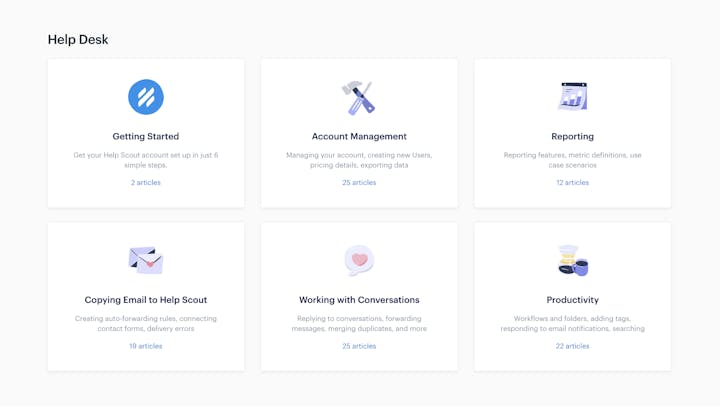
Built-in search functionality and robust organization options make navigating through your content quick and easy for customers. You also get access to insights to better understand which articles are working, which ones need improvement, and if there are any gaps in your content.
Beacon for chat support
With Beacon, you’re able to offer live chat services as well as give access to your entire Docs knowledge base through a convenient widget you can embed on any page of your site or app. This means you’re able to deliver customers the answers they need when and where they need them.
You can scale up your chat support as your team grows with features like agent chat limits and custom statuses. It all adds up to a chat solution that’s ready to meet your needs, no matter what stage you’re at.
Messages for proactive support
Getting a quick response is a great experience, but never having to reach out in the first place is an even better one. With Messages, you can deliver proactive support to customer issues — sending real-time notifications to customers on your website or in your product — creating a truly top-notch customer experience.
You’re able to segment audiences using custom properties you’ve set up in Help Scout. Scheduling capabilities let you pre-plan messages and deliver information right when you want to. To top it off, you also get access to analytics to further refine your efforts and make the most of all your messages.
Customer data management for personalized support
Every customer wants to be treated like a VIP. With customer profiles, you’re able to see past interactions and data from connected apps to create a curated customer experience.
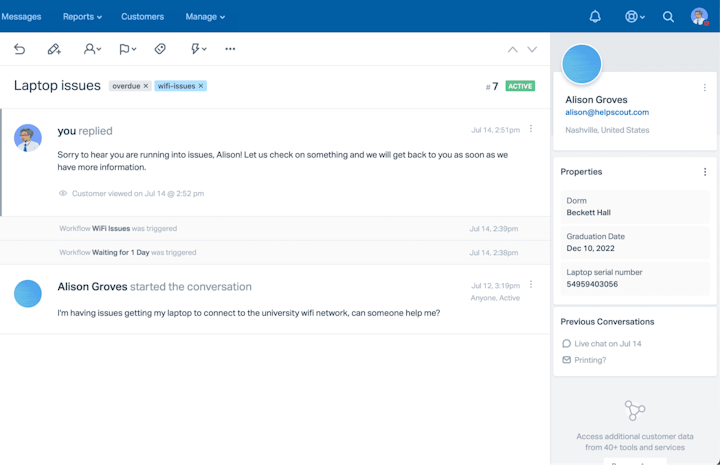
Customer profiles are automatically created for customers you’ve interacted with. You’re able to edit and update customer profiles any time you’d like, ensuring all information is up to date and relevant. You can even automate the updating process by adding a few lines of code to any Beacon implementation.
Reports for improved support and productivity
Help Scout comes loaded with pre-built dashboards so you can see how your team is performing from day one. See what times of day are busiest, common reasons for customer queries, and which channels are most popular with your customers.
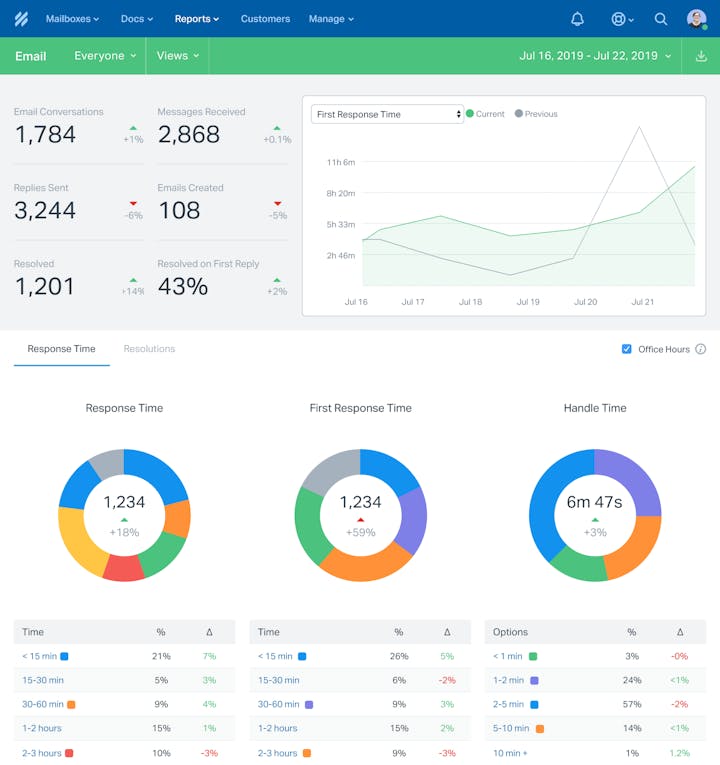
You’re also able to create custom views to refine reports and focus on the metrics that matter most to you. If you want to do even more with your data, you can use our API or FiveTran to connect to the business intelligence tool of your choosing.
Along with our robust tools, we also offer 24/6 support and a top-notch help center where you can get answers to your questions quickly. Best of all, you get everything mentioned here for less than half the cost of a comparable Zendesk plan.
Light users to support collaboration and transparency
Customer support teams aren’t the only departments that can benefit from Help Scout. Create transparency and encourage cross-team collaboration with light users.
The light user role is great for collaborating on client issues, sharing customer feedback, and identifying marketing opportunities. While light users can’t speak directly with customers, they can view or follow conversations, add private notes, view reports and Docs articles, create Messages, and perform other behind-the-scenes tasks that benefit your customers and business.
Light users come standard as part of all new Plus and Pro level plans.
Data migration tools for consistent support
Lastly, Help Scout understands the importance of keeping your level of support high, even through periods of change. The platform’s data migration capabilities simplify the process of bringing your existing customer data and conversation history with you so that your team always has the information required to provide your customers with a great support experience.
Price: Starting at $20/user per month.
Try Help Scout free for 15 days:
2. Zoho Desk
Best Zendesk alternative for sales-focused teams.
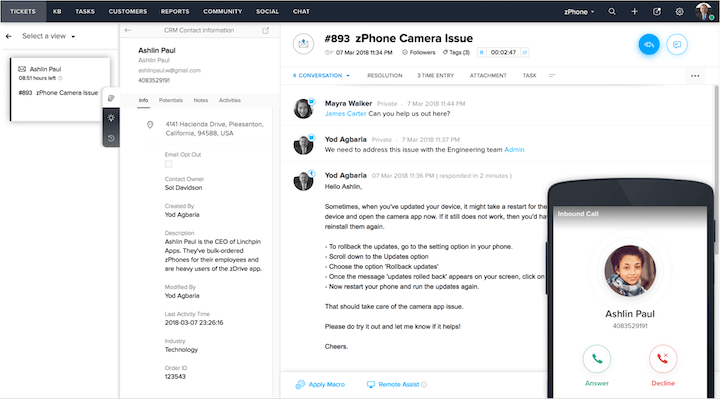
Zoho is probably best known for their customer relationship management tool, but they also make help desk software. Zoho Desk has a number of features like a shared inbox, phone integration, and chat. However, some of those features — like chat — are limited to the highest-cost plan.
Zoho Desk also boasts a strong selection of integrations to connect with the rest of your tech stack. For larger teams, there are team management features you can take advantage of, like time tracking. They even offer AI options for self-service, though that feature is also limited to the highest-cost plan.
Price: Free plan available. Paid plans starting at $14/agent per month.
3. ServiceNow
Best Zendesk alternative for IT teams.
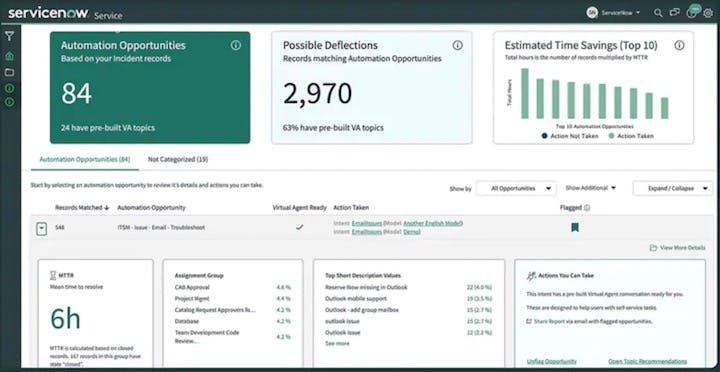
Though it’s common to think about Zendesk as being a customer-facing tool, some also use it for their internal IT requests. Another option on that front is ServiceNow, which is an IT ticketing system that's designed for internal ticket management.
ServiceNow offers features like AI-assisted assignment of support tickets to help boost team members' productivity. Self-service options and virtual assistants help employees get answers quickly, and reports mean you’re able to track performance and find areas of improvement.
Price: Contact ServiceNow directly for pricing.
4. Freshdesk
Best alternative to Zendesk for larger teams.

Freshdesk is probably the tool that most closely resembles Zendesk on this list. It has a shared inbox, a knowledge base, and the ability to connect to other software using apps in its marketplace. It also has some automation capabilities to improve productivity.
Freshdesk also offers a few other features like advanced reporting and the ability to send customer satisfaction surveys (CSAT) when a ticket is closed, but these two features are only offered on its higher-tiered plans.
Price: Free plan available. Paid plans starting at $15/agent per month. Omnichannel plans starting at $29/agent per month.
5. Gorgias
Best Zendesk alternative for small businesses using Shopify.
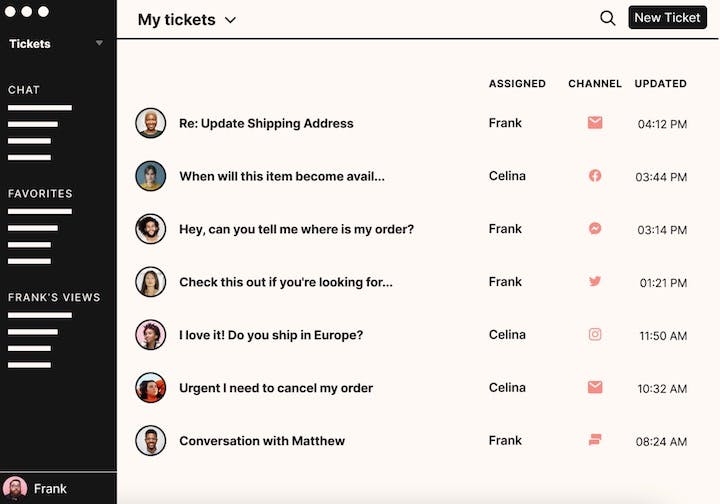
Gorgias is a help desk solution focused on small businesses in the ecommerce space. When you sign up, you get access to a shared inbox and live chat. However, the biggest differentiators are its Shopify, Magento, and BigCommerce integrations (although the Magento integration is only offered on the higher-tier plan).
Through those integrations you’re able to see order details, edit orders, and even do refunds directly from your help desk, which can save a lot of time and hassle for your support agents. Gorgias also has social media integrations with platforms like Instagram and Facebook that let you track conversions on those channels.
Also, all of their plans have ticket limits, meaning your costs could vary month over month depending on volume. To give an idea, their base plan includes 350 monthly tickets, which equals out to around 12 tickets a day — a number most teams would far exceed. From there, you’re charged an additional $25 per 100 tickets.
Price: Starting at $60 per month.
6. HubSpot Service Hub
Best Zendesk alternative for teams using HubSpot.

HubSpot is known for its marketing and sales software, but they recently entered the support space with HubSpot Service Hub. Service Hub is help desk software that includes most standard features like a shared inbox and reporting capabilities.
It also includes satisfaction surveys, automation capabilities, and the option to create a knowledge base. If you’re a HubSpot CRM user, you can connect customer profiles to Service Hub, giving your team even more context and insight.
Price: Free plan available. Paid plans starting at $45/month.
If your team is using Salesforce as your CRM instead of HubSpot, another combined CRM and support software option you might want to consider is Salesforce Service Cloud. Its native integration with Slack makes it a good choice for teams who offer customer service via Slack.
7. Kustomer
Best alternative to Zendesk for teams wanting CRM capabilities.
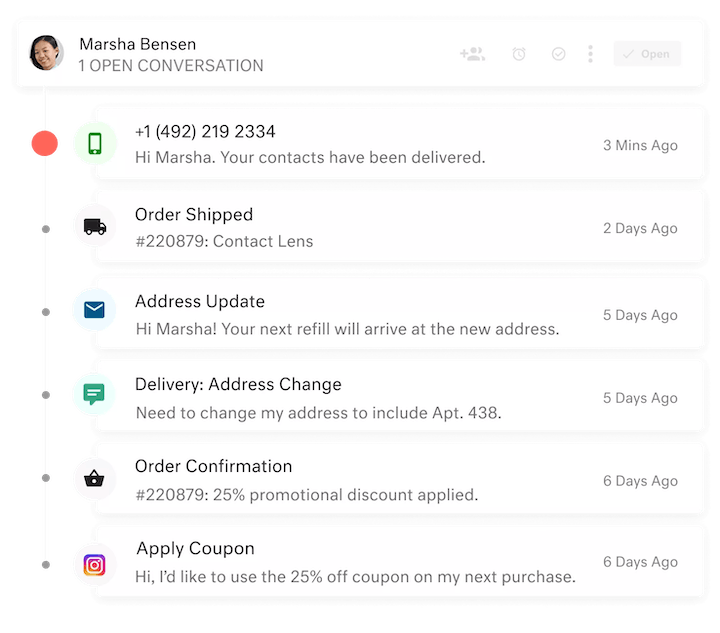
CRMs and help desk software have historically existed separately from each other, but Kustomer combined the two to create a unique type of solution. With Kustomer, you’re able to see a complete picture of each customer and update multiple systems at once, saving time and energy.
Kustomer offers multi-channel support for email, chat, phone, and social accounts. No-code chatbots are also available for deflecting support requests to self-service options.
However, Kustomer is quite expensive and the pricing is somewhat confusing as there are a number of tools that are add-ons. Also, many of its features focus on deflecting requests, which may not be ideal for more customer-centric teams.
Price: Starting at $89/agent per month.
8. Front
Best Zendesk alternative for startups focused on account management.

Most customer support teams use help desk software solutions to manage a group email account (e.g., support@yourdomain.com), but in some cases, it’s useful to have both personal and group email addresses. You’re able to do that with Front.
Along with shared inbox capabilities, Front also has some basic collaboration and automation features. However, some other standard features like analytics are only offered on their higher-cost plans.
Price: Starting at $19/user per month.
9. HappyFox
Best Zendesk alternative for teams wanting project management features.
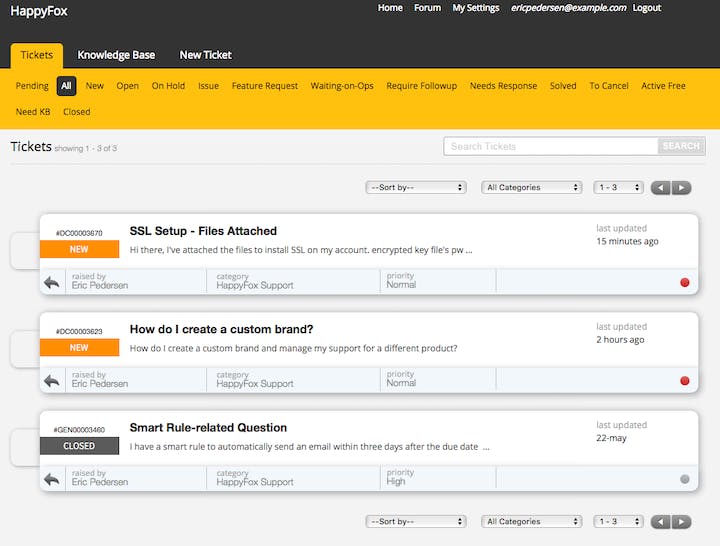
HappyFox is kind of a mashup of help desk and project management software. It includes the usual suspects like a shared inbox, knowledge base software, and some automations to help reduce manual work, but it also has the ability to assign tasks and change task statuses.
All of HappyFox’s help desk plans do have ticket limits, so that’s something to be aware of. Along with their help desk solution, they also offer live chat and even in-app chat tools. However, both of those are separate tools and would need to be purchased independently of their help desk offering.
Price: Starting at $29/agent per month.
10. Intercom
Best Zendesk alternative for teams wanting chat-heavy features.

Intercom is by no means cheap, and its user interface can be overly-complicated. At the heart of Intercom lies its core features: live chat and bots.
The platform boasts an inbox that melds all customer dialogues into a single interface. Thanks to the Intercom Inbox, businesses can curate workflows that automate customer pathways and tasks, including routing customers to relevant knowledge base articles.
The platform integrates with an array of platforms, including Salesforce, WhatsApp, Instagram, Slack, Facebook, Statuspage, and more.
Price: Starting at $74 per month.
11. Tidio
Best alternative to Zendesk for teams running small e-commerce businesses.
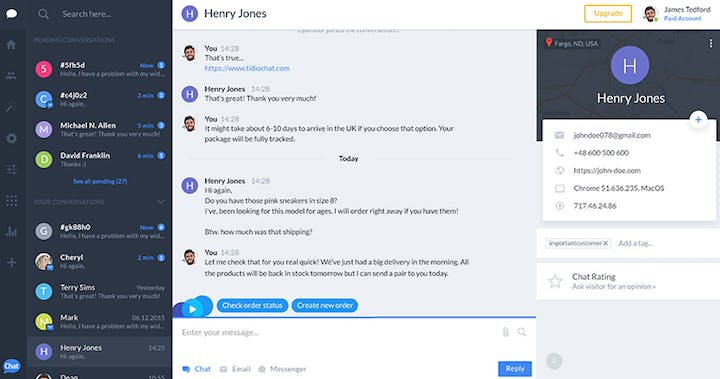
Tidio is a great pick if you're looking for something different than Zendesk. It's perfect for small and medium businesses that are all about e-commerce and sales. Features include live chat, quick before-chat surveys, chat ratings, tracking chat events, and making your chat widget look the way you want.
What makes Tidio stand out is how easy it is to get going, its simple interface, and a chatbot builder that uses ready-made templates to make automation and triggers. The smart AI chatbot feature lets businesses handle more customers with a smaller team.
On top of all that, Tidio works well with different channels. It connects with Facebook and Instagram, and it also works with other platforms like Shopify, WooCommerce, BigCommerce, and Squarespace.
Price: Starting at $19 agent per month.
12. Trengo
Best Zendesk alternative for teams who deal with B2C clients.
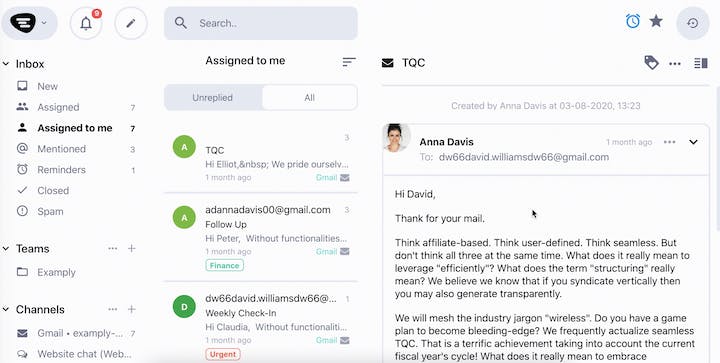
Trengo is an all-in-one communication platform that puts all your customer chats in one place. The platform has strong automation and team features and works with popular e-commerce platforms like Shopify, WooCommerce, and Lightspeed.
Trengo has detailed reporting to help keep track of how happy customers are and how well the platform is working. The downside is that you need at least 5 users for each plan, while the software lacks a strong chatbot and customer portal features, which is surprising given its price point.
Despite this, Trengo does come with a host of other features, including the ability to make help centers, talk to website visitors, and providing a single platform for team chats.
Price: Starting at $90 per month.
13. Dixa
Best alternative to Zendesk for teams that value conversational customer service.
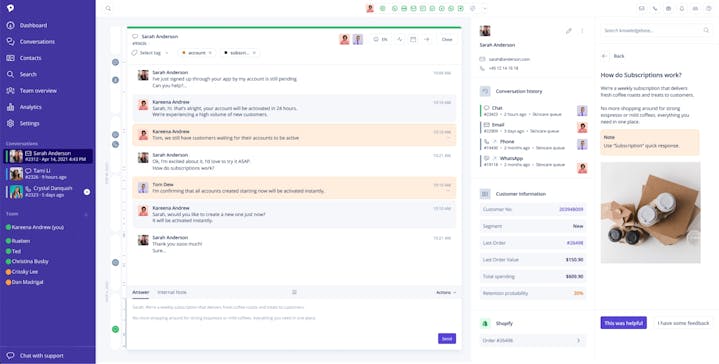
A software that's worth a second look, Dixa is a strong Zendesk rival. Companies aiming to give their customer service software a conversational flavour will find it a good pick. Powered by potent analytics and integrating clever resources, it amplifies an omnichannel journey within an intuitive, user-friendly agent workspace.
A rising star in the customer support software universe, Dixa comes packed with useful capabilities. It brings together all of the critical communication channels — voice, chat, email, and social platforms. With comprehensive analytics, customer satisfaction assessments, and chatbot development, it's loaded to the brim.
Dixa shines as an excellent Zendesk substitute for swiftly scaling teams. Equipped with integration capabilities with platforms like Salesforce, Shopify, Jira, and Zapie you don't need to worry about it working with other tools in your stack.
Price: Starting at $39/agent per month.
Zendesk competitor comparison chart
| Tool | Price | Customer reviews | Key features | Best for |
|---|---|---|---|---|
Help Scout | Starting at $20/user per month. | 4.7 out of 5 on Capterra |
| Growing teams who care about delivering exceptional support |
Zoho Desk | Free plan available. Paid plans starting at $14/agent per month. | 4.5 out of 5 on Capterra |
| Sales-focused teams who are already using Zoho CRM |
ServiceNow | Contact for pricing. | 4.3 out of 5 on Capterra |
| IT teams managing internal requests |
Freshdesk | Free plan available. Paid plans starting at $15/agent per month. Omnichannel plans starting at $29/agent per month. | 4.5 out of 5 on Capterra |
| Larger, call center-type teams |
Gorgias | Starting at $60/month. | 4.7 out of 5 on Capterra |
| Teams using Shopify |
HubSpot Service Hub | Free plan available. Paid plans starting at $45/month. | 4.4 out of 5 on Capterra |
| Teams using HubSpot CRM |
Kustomer | Starting at $89/user per month. | 4.5 out of 5 on Capterra |
| Teams wanting more native CRM capabilities in their help desk |
Front | Starting at $19/user per month. | 4.5 out of 5 on Capterra |
| Teams wanting to use personal email addresses for support |
HappyFox | Starting at $29/agent per month. | 4.6 out of 5 on Capterra |
| Teams wanting project management features built into their help desk |
How to choose the tool that's right for your team
Zendesk is a very complex product with lots of different features. For those who have the time and need for all those different features, it’s an asset. However, for more agile teams, it ends up being a complication.
The reality is that Zendesk is optimized to meet the needs of very large teams at companies with more than 500 employees. For leaner, growing teams at SaaS, ecommerce, online services, and DTC companies, there are a number of Zendesk competitors who may align more closely with your needs.
Knowing your options is a good place to start when looking for a new support platform. Before you make a choice, though, it’s helpful to dive a little deeper.
To start, ask yourself these three questions:
What can I afford? Budget is a common constraint for most teams. Creating a shortlist based on budget is a simple way to narrow options early in your search.
What features are non-negotiable? Make a list of all the possible features you might want in a potential tool, then go through and mark which are “need to have” vs. “nice to have.”
What’s my timeline? Some tools take longer to set up than others. Make sure you take into consideration how long initial set up and training will take for any potential new tool.
After answering those questions, narrow your list down to 2-3 options and do demos and trials of each. Having hands-on experience can help you see what works best in a real-world environment.
Also, since multiple types of roles — agents, managers, etc. — will use the tool, it’s good to have people from each of those areas test the final contenders. That way you ensure the option you choose works well for everyone.
Beyond the features and functionality of the software, be sure to check out other aspects of each offering. Visit each tool’s help center and send an email to their support team to evaluate their customer communication. If all things are equal between two tools, the strength of those resources could be a deciding factor.
Learn more about Help Scout:
Finding the best support platform for your team
There’s no denying that Zendesk makes a great product. If you’re a very big team with an even bigger budget, they may very well be the right option for you. For everyone else, there’s probably a solution that gets you all the features and functionality you really need without breaking the bank.
Take the time to truly dial into what your needs are and which tools you need access to in order to address them. Finding the right solution is much easier when you have those items nailed down. From there, it’s simply testing the options and seeing what fits best.
Did you know that we also have this guide available in French and German?



